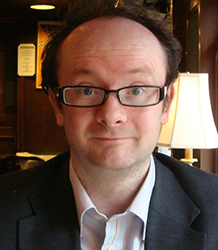Podcast episode
September 27, 2017
Episode 6: Magicians, Ghosts, Amulets, and Spells: Daniel Ogden on Græco-Roman Magic

Professor Daniel Ogden takes us on a tour through magic in the ancient world. We discuss the kinds of evidence available (literary texts, recipes like the Greek Magical Papyri, curse tablets, ‘voodoo dolls’, and even the occasional magical implement which survives from antiquity (see the photograph above), some of the problems of definition which occur in studying ancient magic, and the types of magical practitioners who populated the ancient world.
We then turn to a number of fascinating related subjects, including ghosts, amulets, and the nature of the ancient Greek ‘shamans’, as they are known. Finally, Professor Ogden gives us some insight into the traditional voces magicæ, including the famous Ephesia grammata, and presents his own findings regarding the process by which spells which seem meaningless may have evolved from meaningful phrases in foreign languages, become fossilised as meaningless, but powerful, spells, and then been re-charged with meaning in their new, magical context.
This is a fascinating interview throughout, but from the discussion of the enduring power of amulets onwards, Ogden is on fire! Not to be missed.
Specific points discussed include:
- A detailed discussion of the origins, earliest appearances, and definitional spheres of the two most important ancient terms for magical practitioners, magos (‘mage’) and goês (‘sorcerer’),
- A look at some other types of ancient magical practitioners, including the mantis (diviner), psychagogos (soul-drawer), agourtês (beggar-priest), aoidos (singer, hence ‘enchanter’), and my personal favorite, the engastrimythos (person-with-a-dæmon-talking-in-their-tummy),
- The kinds of things ancient mages and sorcerers were thought to get up to,
- The Græco-Roman conception of a ghost, the ways in which they were thought to interact with the living, and the magical uses to which they could be put,
- A case-study, taken from Apuleius’ Metamorphoses (2nd c. CE), of a man murdered by a ghost,
- Apuleius was of course not only a writer of amazing ghost-stories, but a Platonist philosopher who was himself accused of magic and had to defend himself in court (and his account of his defence speech survives!). We talk about that a bit,
- The universal importance of amulets down to the present day,
- The Greek ‘shamans’, their relationship to the Pythagorean tradition, and some discussion of their many powers, featuring the case-study of Aristeas of Proconnesus,
- A fascinating discussion of voces magicæ (words of power with no obvious meaning, but believed to be powerful in-and-of themselves), with a theory about the ways in which they evolve, and a fascinating comparative discussion of spells for healing fractured bones which takes us all the way back to the steppe home of the proto-Indo-Europeans!
Interview Bio
 Professor Daniel Ogden is Professor of Ancient History at the University of Exeter, and a world-renowned scholar on ancient magic. As this Ogden Bibliography shows, he has published widely on magic and many other fascinating themes.
Professor Daniel Ogden is Professor of Ancient History at the University of Exeter, and a world-renowned scholar on ancient magic. As this Ogden Bibliography shows, he has published widely on magic and many other fascinating themes.
Works Discussed in this Episode
- Apuleius, Pro se de magia liber (Apologia), Helm, R. (Ed.), 1959. Teubner, Leipzig.
- – Metamorphoses: the tale of the miller murdered by the ghost can be found at IX 29-31.
- Betz, H. D., 1996. The Greek Magical Papyri in Translation, Including the Demotic Spells. University of Chicago Press, Chicago, IL.
- Brashear, W. (1995). ‘The Greek Magical Papyri: an Introduction and Survey, Annotated
Bibliography (1928–1994)’, ANRW II 18 : 3380-3684. - Burkert, W., 1972. Lore and Science in Ancient Pythagoreanism. Harvard University Press, Cambridge, MA.
- Dodds, E. R., 1968. The Greeks and the Irrational. University of California Press, Berkeley, CA.
- Ogden, D., 2002. Magic, Witchcraft, and Ghosts in the Greek and Roman Worlds: A Sourcebook. Oxford University Press, Oxford.
Themes
Amulets, Apuleius, Ephesia grammata, Ghosts, Interview, Magic, voces magicæ


Astrid Larsen
January 13, 2019
Love the dynamic between you (Earl) and Ogden! Hugely literate and well read people, but clearly Pythonists at heart. (i.e. Ogden’s imagery of ghosts putting thier feet up in the underworld.)
We come from the psychology stream, and William James would concur with Ogden’s remarks about wedding rings and wrist watches being meaningful in both a sensory and perceptual way, and associations in the mind making the two more meaningful in a spiritual way.
Roman Zabicki
February 5, 2022
I really like the idea that a phrase from one language would be preserved by speakers of a different language, but over time that phrase’s meaning would be corrupted, lose its meaning, and then gain a new meaning. I read somewhere that that exact process happened with the phrase “hocus pocus”. In the Latin Catholic mass, at the moment of transubstantiation, the priest says “Hoc est corpus”, which I believe is Latin for “this is body”. I can’t prove this is how it went, but it seems believable to me.
Earl Fontainelle
February 5, 2022
I always heard that about hocus pocus; seems plausible. But that’s a slightly different thing: Protestants making fun of the Catholic ‘magic’ (the magic accusation was and remains a big part of Protestant anti-Catholic propaganda). Still, Latin is kind of a magical language in the church in the sense that it’s not understood by the congregation, and when the priest speaks it, you know he means business and can get things done. Hence the huge resentment among many Catholics at the second Vatican council’s decision to go vernacular: ‘Give us back our mag-, er, efficacious ritual language!’
Roman Zabicki
February 6, 2022
Ah, good point. If this happened, it is a bit different. I didn’t know about the Protestant angle to this. That’s interesting.